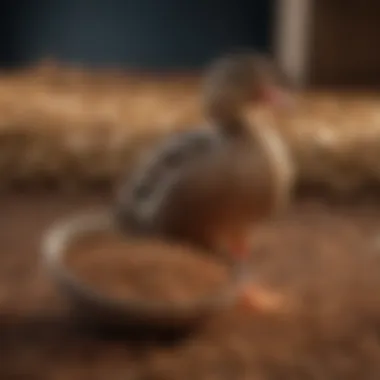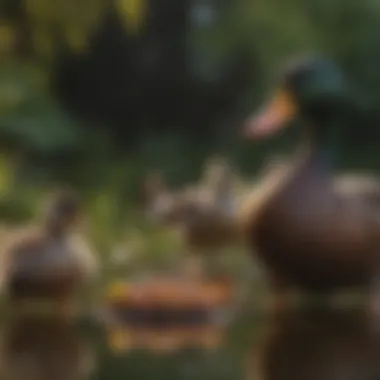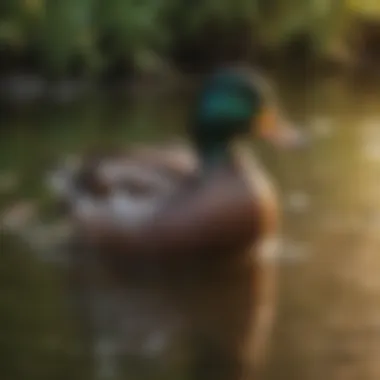The Comprehensive Guide to Purina Duck Feed Pellets


Intro
Understanding the right nutrition for ducks is essential for their health and growth. Purina Duck Feed Pellets provide a balanced diet specifically designed for ducks, with ingredients that cater to their unique nutritional needs. This guide aims to explore these pellets in detail, including their composition, usage, and numerous benefits.
Ducks require specific nutrients to thrive, making it vital for duck enthusiasts to have accurate information about their dietary options. Whether you are a novice duck owner or experienced in caring for these birds, knowing how to effectively use Purina Duck Feed Pellets will enhance the welfare and productivity of your flock.
Nutrition and Diet Tips
Ducks have distinct dietary requirements to ensure optimal health. Purina Duck Feed Pellets are crafted with layers of nutrition.
- Protein: Essential for growth and egg production, the pellets contain high-quality protein sources.
- Vitamins and Minerals: Various vitamins and minerals promote immune function and overall well-being, ensuring ducks remain healthy.
- Fiber: The inclusion of fiber supports proper digestion, which is critical in duck diets.
- Fat: Healthy fats are included for energy requirements, particularly during the colder months.
When feeding, pay attention to the age and size of the ducks. Younger ducks and layers may have differing nutritional needs.
Common Health Issues and Solutions
Ducks can encounter several health issues that can be mitigated by proper nutrition and care. Common problems may include:
- Obesity: Overfeeding or incorrect feed ratios can lead to obesity. It is important to follow feeding guidelines and ensure adequate exercise.
- Feather loss: This can occur due to poor nutrition. Ensuring ducks receive enough protein can reduce this risk.
- Digestive problems: Often caused by sudden dietary changes or poor feed quality. Always transition to new feed gradually.
Regular observation of your ducks helps identify any health issues early on.
Importance of Regular Check-Ups
Routine veterinary care is crucial for maintaining duck health. Regular check-ups help prevent illnesses and guarantee that ducks are receiving a balanced diet. A vet can provide specific dietary recommendations based on health assessments, enhancing the ducks’ overall quality of life.
Regular veterinary visits can safeguard your flock's health and ensure you are on the right track with their nutrition.
These practices contribute greatly to the longevity and productivity of your ducks, helping you to enjoy a healthy and thriving flock over time.
Preface to Purina Duck Feed Pellets
Purina Duck Feed Pellets represent a crucial element in the overall health and productivity of ducks. The focus on this topic is relevant for anyone who owns or cares for ducks, whether for recreational purposes or commercial use. Understanding these feed pellets is essential, as it helps in making informed decisions about the nourishment of your flock. Nutritional requirements change based on several factors, including age and purpose of raising ducks. This nuanced understanding is central to providing optimal care.
Overview of Duck Nutrition
Ducks, like all birds, require a balanced diet to ensure their growth, health, and productivity. The nutritional needs are distinct from those of other poultry species. A well-balanced diet supports not only physical health but also immunity against diseases. Ducks benefit from a diet rich in proteins, vitamins, and minerals. Specifically:
- Proteins are vital for growth and development.
- Carbohydrates provide energy, crucial during active periods.
- Fats are necessary for insulation and energy reserves.
A nutritious diet significantly impacts egg production rates in laying ducks as well. Without the correct balance, ducks may face deficiencies that affect their health and productivity.
Importance of Quality Feed
Quality feed is perhaps the most influential factor in duck husbandry. The right feed pellets, such as those from Purina, contain optimal nutrients tailored for specific types of ducks. Quality feed ensures that ducks receive adequate nutrition while minimizing waste. Poor-quality feed can lead to health problems, reduced egg yield, and even higher mortality rates.
Quality in feed translates directly to health and production success for your ducks.
When selecting feed, consider the following:
- Ingredient sourcing: Real and meaningful ingredients contribute to better nutrition.
- Nutritional analysis: A look into the nutrient breakdown helps ascertain the suitability of the feed.
- Brand reputation: Established brands like Purina often have reliability in their formulations.
Nutritional Composition of Purina Duck Feed Pellets
Understanding the nutritional composition of Purina Duck Feed Pellets is essential for ensuring the health and growth of ducks. A well-structured diet plays a crucial role in their overall well-being. Each component of the feed contributes uniquely to the ducks' needs, with specific ingredients providing necessary nutrients.


A solid grasp of the nutritional composition helps duck owners choose the right amount and type of feed tailored to their flock's age and growth stage. By examining the core components, one can appreciate how Purina Duck Feed Pellets facilitate not just growth but long-term health and productivity in ducks.
Key Ingredients
Purina Duck Feed Pellets are formulated with several key ingredients, each serving significant purposes. Notably, corn is a primary component, providing energy. Other grains such as wheat and barley contribute carbohydrates.
Moreover, protein sources like soybean meal or fish meal are incorporated to support muscle development.
In addition to grains, these pellets often contain various by-products such as vitamins and minerals, which enhance their nutritional value. The meticulous selection of these ingredients ensures a balanced diet that ducks require at different stages of their lives.
Benefits of Key Ingredients
- Energy Provision: Corn acts as a principal energy source, critical for growth and daily activities.
- Muscle Development: Protein sources are vital for building strong muscles in growing and breeding ducks.
- Digestibility: The carefully selected grains ensure that ducks can digest the feed efficiently, maximizing nutrient absorption.
Vitamins and Minerals
Vitamins and minerals are integral to the nutrition of ducks. Essential vitamins like A, D, E, and the B vitamins play roles in various metabolic processes. Vitamin A supports vision and immune function, while Vitamin D is crucial for calcium absorption, promoting bone health.
Minerals such as calcium, phosphorus, and various trace elements are necessary for strong eggshell formation and overall health. A well-balanced diet includes these elements in sufficient amounts to prevent deficiencies that might lead to health problems later.
Importance of Vitamins and Minerals
- Immunity Boost: Essential vitamins help strengthen the immune system, rendering ducks resilient against diseases.
- Structural Integrity: Calcium and phosphorus are vital for bone structure and eggshell quality.
- Metabolic Function: B vitamins aid in energy metabolism, ensuring ducks have the energy required for daily activities.
Protein Content
The protein content in Purina Duck Feed Pellets is among the most important aspects of their nutritional profile. Adequate protein is crucial for growth, feather development, and reproductive functions in ducks. This content typically ranges around 16% to 20%, providing the necessary building blocks for muscle and tissue growth.
High protein levels are especially important for ducks at growth stages or for those that are breeding. The amino acids provided through quality proteins support overall health and optimize egg production.
Key Aspects of Protein Content
- Growth Support: A high protein level aids in the fast, healthy growth of ducklings.
- Feather Growth: Protein is critical during molting and for the growth of new feathers.
- Egg Production: Breeding ducks benefit from protein, which impacts egg size and quantity.
Proper nutrition through Purina Duck Feed Pellets can significantly improve your ducks' health, growing fast and strong while ensuring they produce high-quality eggs.
Benefits of Using Purina Duck Feed Pellets
When it comes to raising ducks, the type of feed you choose is crucial. Purina Duck Feed Pellets offer numerous advantages that enhance not only the growth and health of ducks but also their overall productivity. Understanding these benefits can help pet owners and animal lovers make informed decisions in feeding their flock. This section details how Purina Duck Feed Pellets contribute to key areas such as growth enhancement, egg production, and overall health.
Enhancing Growth
Ducks, especially during their early life stages, require a specific nutritional balance to support growth. Purina Duck Feed Pellets are designed with this in mind. They provide essential nutrients in an easily digestible form, ensuring that ducks can convert feed efficiently into body mass. This is particularly important for ducklings as they need adequate protein and energy for optimal development.
- High Protein Content: The pellets contain a high level of protein, which supports muscle development.
- Balanced Energy Sources: The formulation includes carbohydrates and fats that provide energy necessary for physical growth.
- Digestive Health: The inclusion of fiber aids in digestion, allowing ducks to process food more effectively.
These features combined lead to healthier, larger birds, which can be particularly beneficial for those raising ducks for meat production.
Improving Egg Production
For ducks kept primarily for egg production, nutrition plays a vital role. Purina Duck Feed Pellets are formulated to enhance the reproductive performance of ducks. A well-balanced diet improves both the quantity and quality of eggs.
- Nutrient-Rich Ingredients: These pellets contain necessary vitamins and minerals that support reproductive health.
- Consistent Egg Laying: The quality diet encourages more consistent laying patterns.
- Shell Quality: Ensuring ducks receive proper calcium and phosphorus through these pellets leads to eggs with stronger shells.
This means flock owners can expect a higher yield of eggs with better overall quality, helping to satisfy market demands or personal consumption needs.
Promoting Overall Health


Feeding ducks with quality feed like Purina Duck Feed Pellets ultimately leads to improved health. This includes stronger immune responses and resistance to diseases. Ducks receiving balanced nutrition can thrive and maintain their vitality over longer periods.
- Immune Support: Vitamins such as A, D, and E help in bolstering the immune system.
- Natural Energy Levels: A balanced diet keeps ducks energetic, thus reducing stress and promoting well-being.
- Disease Prevention: Proper nutrition lowers the risk of such common health issues as obesity and nutritional deficiencies.
In summary, choosing Purina Duck Feed Pellets can have a significant impact on the success of duck-raising endeavors by enhancing growth, improving egg production, and promoting overall health. This feed ensures that ducks receive comprehensive nutrition tailored to their needs, making it a prudent choice for both novice and seasoned duck owners.
“Proper nutrition is the cornerstone of good animal husbandry, particularly for ducks, which have unique dietary needs.”
Feeding Guidelines for Purina Duck Feed Pellets
Feeding guidelines are crucial when considering the best practices for your ducks. Purina Duck Feed Pellets provide a structured approach towards nutrition, catering to the unique needs at various life stages. Understanding how to properly feed ducks ensures they receive balanced nutrients, promoting optimal health and productivity. In this section, we will cover essential factors, including specific nutritional needs by age, suggested feeding quantities, and appropriate frequency of feeding.
Duck Ages and Specific Nutritional Needs
Nutritional requirements for ducks fluctuate as they grow. It is vital to adjust their diet according to their age to ensure they meet their specific developmental needs.
Feeding Ducklings
Feeding ducklings requires careful consideration. Newly hatched ducklings need a diet rich in protein, which is essential for their rapid growth and development. Purina’s specific formula for ducklings provides adequate amounts of protein, recommended at 18-20%. This is a beneficial characteristic, as proper protein intake supports muscle and feather development. A unique feature of feeding ducklings is that they often consume feed frequently, needing easy access throughout the day. Overfeeding, however, can lead to obesity, an important aspect to note when caring for these young birds.
Feeding Growers
For growers, which are ducks between the ages of eight weeks to maturity, the focus shifts to balanced nutrition for growth and preparation for breeding. A quality feed suitable for this life stage, like Purina Duck Feed Pellets, adjusts protein levels down to around 15-16%. This balance is pivotal, as it prevents excessive weight gain while still supporting necessary growth. One thing to consider about feeding growers is their requirement for higher energy levels which may not be met by standard feeds. Hence, choosing a specialized pellet provides necessary energy while controlling overall fat intake to avoid health issues.
Feeding Breeding Ducks
Breeding ducks have distinct nutritional needs, as their health directly impacts egg production and viability. The formulation for breeding ducks will typically have higher protein levels, around 16-18%. This characteristic is important for the development of eggs and for the health of the mother duck. A unique aspect of feeding breeding ducks is the need for additional nutrients like calcium, which supports strong eggshell formation. Monitoring their weight becomes essential during this stage, as overweight breeding ducks can face reproductive challenges.
Suggested Feeding Quantities
Feeding quantities should be adjusted based on the duck's age, size, and purpose. For ducklings, it’s often recommended to feed around 1/4 pound of feed per duck per day, while growers may require about 1/3 to 1/2 pound daily. The feeding amount for breeding ducks tends to be closer to 1/2 to 2/3 pound. Monitoring the ducks’ body condition is essential to tailor the feeding amount effectively.
Frequency of Feeding
Feeding frequency also plays a role in how well ducks utilize their feed. Ducklings should have access to feed multiple times a day, as they need consistent energy to grow. As ducks grow to adulthood, they generally do well with two feedings daily. Ensuring a regular schedule helps maintain their feeding routine and supports digestive health.
This structured approach to duck feeding can significantly enhance their overall well-being and productivity. Proper nutrition is the foundation for healthy ducks, ultimately leading to better growth and egg production.
Observing Feeding Behavior
Observing feeding behavior is an essential aspect of understanding the overall health and well-being of ducks. Proper observation can inform owners about the dietary habits of their flock, helping to identify any potential problems early on. Ducks can exhibit various feeding behaviors, and being aware of these can lead to informed decisions regarding their nutrition and overall care.
Feeding behavior can also give insights into the nutritional adequacy of the diet provided. For instance, ducks that are consistently not consuming enough feed may be lacking in certain nutrients, or they may be unhappy with the food's flavor or texture.
Additionally, monitoring feeding behavior assists in recognizing patterns that are important for the proper maintenance of their environment. A clean and well-managed feeding area minimizes the risk of disease transmission, allowing for healthier birds.
Signs of Healthy Eating
Identifying signs of healthy eating in ducks is crucial. Healthy eating reflects an adequate diet and a content flock. Here are some key indicators:
- Active and Engaged: Ducks that are healthy eat with purpose. They will actively forage and show enthusiasm when it's feeding time.
- Normal Weight: Consistent weight within the expected range indicates that the ducks are getting proper nutrition. Regularly monitoring their weights can help track changes over time.
- Clean Feeding Area: After feeding, a clean area suggests that ducks are consuming their feed effectively without excessive waste.
- Firm Droppings: The appearance of droppings can provide hints about diet. Well-formed droppings indicate proper digestion and nutrient absorption.
"Understanding your ducks' feeding habits helps you tailor their nutrition effectively."
Common Feeding Problems
Despite best efforts, feeding problems can still arise. Recognition of these issues allows for quick intervention. Here are some common feeding problems to look for:


- Selective Eating: Some ducks may pick out specific ingredients and avoid others, leading to imbalanced nutrition. This behavior might indicate a preference for certain flavors or textures.
- Overeating: Ducks can overeat if feed is always available, leading to obesity and related health issues. It's crucial to manage feeding amounts to encourage a balanced diet.
- Underfeeding: If the feed is insufficient, ducks might not thrive. Watching for weight loss or lethargy is essential. Regular assessment of feeding quantities helps prevent this.
- Aggression at Feed Time: Sometimes, competition for food can lead to aggression among ducks, which can cause stress and injuries. Understanding the dynamics of the flock is important for ensuring a peaceful feeding environment.
Common Health Issues Related to Nutrition
Understanding common health issues related to nutrition is essential for anyone taking care of ducks. Nutrition plays a significant role in the overall health and well-being of these birds. Inadequate or unbalanced diets can lead to serious health problems, which may impact growth, egg production, and longevity. It is important to recognize the signs of nutritional deficiencies and excesses. Both conditions can severely affect your flock.
Nutritional Deficiencies
Nutritional deficiencies occur when ducks do not receive certain essential nutrients in adequate amounts. This can happen for various reasons, such as feeding a poor-quality diet or not providing appropriate supplements.
Some common deficiencies include:
- Vitamin A: Lack of vitamin A can result in poor feathering and eye problems. Ducks may become more susceptible to infections.
- Calcium: Insufficient calcium intake can lead to weak egg shells in laying ducks, which may result in breakage and low production.
- Protein: A low-protein diet can stunt growth in ducklings and reduce overall health in adults.
Identifying these deficiencies involves observing your ducks regularly. Symptoms may include poor growth rates, reduced egg production, and behavioral changes. A balanced diet that includes various vitamins and nutrients is critical for prevention.
Obesity in Ducks
Obesity is an increasingly common issue among ducks, especially in captive environments. Feeding excess calories or high-fat diets can lead to weight gain. It is important to monitor the diets provided, particularly when using products like Purina Duck Feed Pellets.
Signs of obesity in ducks can include:
- Difficulty moving or waddling
- Excessive abdominal fat
- Reduced activity levels
- Breathing difficulties in extreme cases
Managing weight involves offering a balanced diet with proper feeding quantities. Additionally, providing ample space for exercise and natural foraging behaviors can prevent obesity. Regular health checks will help in maintaining a thorough understanding of their condition.
Proper nutrition is key to preventing obesity and ensuring optimal health in your ducks.
Storage and Handling of Duck Feed Pellets
Storing and handling duck feed pellets is essential for maintaining both the quality and nutritional value of the feed. Proper storage conditions can prevent spoilage, retain the feed's freshness, and ensure ducks receive optimal nutrition. Interest in duck farming has risen, making it all the more crucial for owners to understand how to effectively manage their feed to promote health and productivity.
Optimal Storage Conditions
To achieve optimal storage conditions, it is important to consider factors like temperature, humidity, and light exposure. Duck feed pellets should be kept in a cool, dry place. High temperatures can cause the fats in the feed to become rancid, which not only affects flavor but can also harm the health of the ducks when consumed.
A humidity level below 15% is ideal. If the pellets are exposed to moisture, they can develop mold, which poses serious health risks to ducks. Using airtight containers is advisable, as they can protect the pellets from moisture and pests. Stored feed should also be kept away from direct sunlight. Ultraviolet (UV) rays can degrade vitamins and other nutrients critical for duck health.
“Proper storage not only prolongs the shelf life of feed but also plays a crucial role in the overall health of your ducks.”
Avoiding Contamination
Avoiding contamination is a critical aspect of feed management. This involves both preventing physical contamination and microbial growth. When storing duck feed pellets, it is essential to keep them away from potential pollutants. Items such as cleaning supplies, fertilizers, or garden chemicals should not be stored nearby, as they can release fumes or spills that contaminate the feed.
Inspect the storage area regularly to check for signs of rodents or insects, as these pests can compromise the integrity of the feed. Clean the storage containers before refilling them and ensure they are free of residues from previous contents.
To reduce the risk of bacterial contamination, it's wise to avoid letting the feed sit out for prolonged periods if it is not in use. If there is any sign of spoilage in the pellets, such as unusual smells or colors, they should be disposed of immediately. Using only high-quality, preferably locally-sourced feed further minimizes the risks associated with contamination.
Following these guidelines ensures that the duck feed remains safe and nutritious, providing owners the peace of mind necessary for confident feeding.
Culmination
The conclusion section of this article underscores the importance of understanding Purina Duck Feed Pellets in order to ensure optimal duck health and productivity. Ducks require a balanced diet to thrive, and feed pellets serve as a primary source of nutrition. This section synthesizes the relevant points discussed throughout the article. It emphasizes the need for quality feed, tailored feeding strategies based on the duck's life stage, and the awareness of potential health issues linked to improper nutrition.
Summary of Key Points
- Purina Duck Feed Pellets provide essential nutrients for growth and egg production.
- Proper feeding guidelines should take into account the age and specific needs of ducks.
- Monitoring feeding behaviors helps in identifying potential health concerns.
- Storing and handling feed correctly is crucial to maintain its quality and prevent contamination.
In essence, consistent adherence to these guidelines enhances the overall well-being of ducks.
Final Thoughts on Duck Nutrition
Nurturing a healthy flock involves more than just providing adequate feed. Duck nutrition is a layered subject requiring attention to ingredient quality, nutrient levels, and individual ducks’ characteristics. As a duck owner, being informed about the nutritional compositions of products like Purina Duck Feed Pellets can significantly impact the health of your birds. Regular observation of their eating habits contributes to effective management and timely interventions when issues arise. Ultimately, the health and productivity of ducks largely depend on sound nutritional practices, making them a priority for any dedicated owner.







